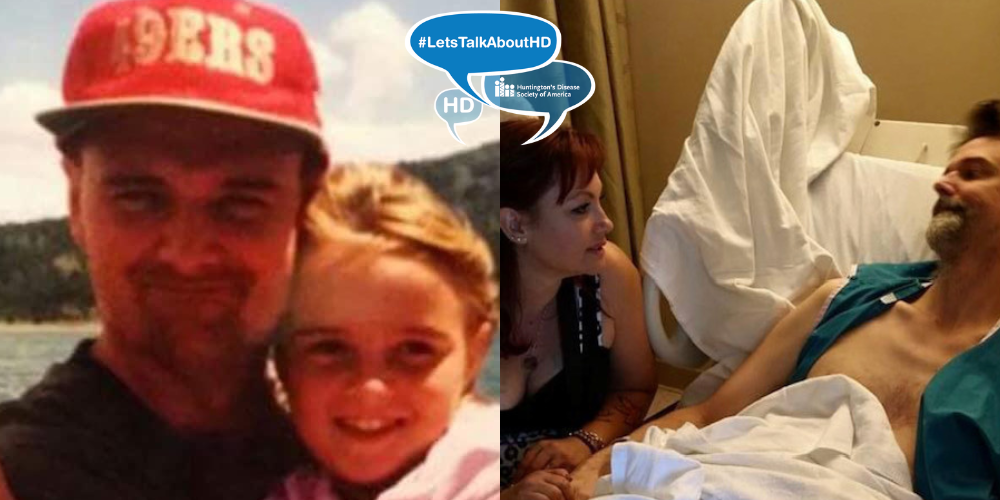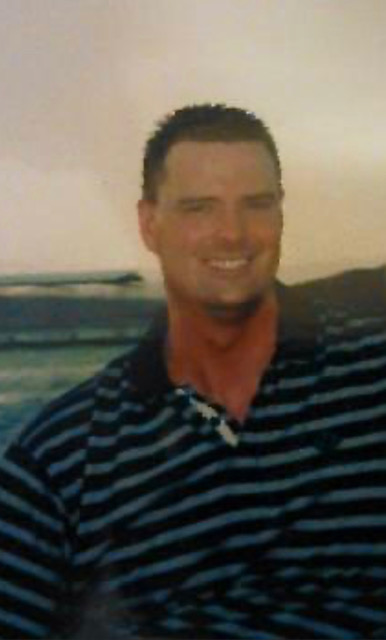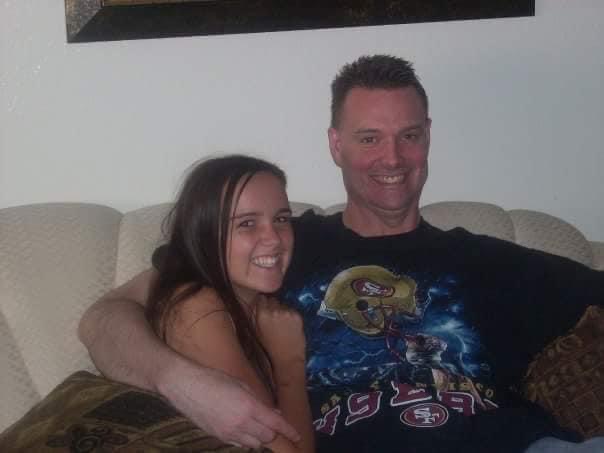
By Matthew Santamaria (msantamaria@hdsa.org)
Las Vegas resident Katie Shaub is not at risk for Huntington’s disease (HD), but she learned about the disease first-hand.
HD is a fatal genetic disorder that causes the progressive breakdown of nerve cells in the brain. It deteriorates a person’s physical and mental abilities during their prime working years and has no cure.
According to Katie, her ex-husband, Raymond, was at risk for HD as his brother informed the family about his positive diagnosis. Eventually, Raymond started to experience HD-related symptoms.

Symptoms include personality changes, mood swings, depression, forgetfulness, impaired judgment, unsteady gait, involuntary movements, slurred speech, difficulty in swallowing, and significant weight loss.
Upon learning more about HD, this would terrify Katie for what was to come. The family would go to a local support group as they learned more about HD. Support groups can offer vital emotional support, valuable advice about community-based resources as well as guidance from other group members about many of HD’s most challenging situations. To learn more, click here
Raymond’s symptoms include twitching and suffering from depression. According to Katie, he was taking anti-depressants and was in car accidents.
He also started to have uncommon behavior and people around him did not pick up on it. According to Katie, he was arrested for DUI and public intoxication but he wasn’t drunk. The misconception was due to the effects of HD. His symptoms matched those of a drunk person.
There have been documented cases of people with HD having difficult interactions with law enforcement because their symptoms are misidentified, misunderstood, or mishandled. To read more, click here
As his symptoms progressed, he was placed in the hospital. In 2015, at 43-years-old, Raymond passed away due to complications from HD. According to Katie, Raymond's father and his entire family passed away from HD as well. However, the HD battle was not over yet.
Every child of a parent with HD has a 50/50 chance of inheriting the faulty gene. Raymond and Katie had a daughter named Sarah and she would later decide to get tested.

The decision to get genetically tested is difficult to make. Each year, 5-10% are tested. It is never the right or wrong decision to be tested. There are people that see no benefit in knowing that they will develop the disease while others want to know in order to make informed choices about their future. It can take up to several weeks to receive your results from the genetic testing center.
For Sarah, it was important to surround herself with friends and family. She was only 19-years-old when her father was diagnosed with HD. Before getting tested, Sarah would feel scared and overwhelmed as it was a lot for her to handle. She also suffered from depression.
Then, her results came back and Sarah tested negative. She would experience survivor’s guilt as she felt more depressed. Sarah stopped going to support groups because she felt out of place.
###
Huntington’s disease (HD) is a fatal genetic disorder that causes the progressive breakdown of nerve cells in the brain. It deteriorates a person’s physical and mental abilities during their prime working years and has no cure. Every child of a parent with HD has a 50/50 chance of inheriting the faulty gene. Today, there are approximately 41,000 symptomatic Americans and more than 200,000 at-risk of inheriting the disease. The symptoms of HD are described as having ALS, Parkinson’s and Alzheimer’s – simultaneously.
The Huntington’s Disease Society of America is the premier nonprofit organization dedicated to improving the lives of everyone affected by HD. From community services and education to advocacy and research, HDSA is the world’s leader in providing help for today and hope for tomorrow for people with HD and their families.
HDSA was founded in 1967 by Marjorie Guthrie, the wife of legendary folk singer Woody Guthrie. Woody died from HD complications when he was only 55 years old, but the Guthrie family legacy lives on at HDSA to this day.
To learn more about Huntington’s disease and the work of the Huntington’s Disease Society of America, visit www.HDSA.org or call 1(800)345-HDSA.
This is a story featuring a personal experience with Huntington’s disease. If you would like to have your story told please contact Matthew Santamaria at msantamaria@hdsa.org
Las Vegas resident Katie Shaub is not at risk for Huntington’s disease (HD), but she learned about the disease first-hand.
HD is a fatal genetic disorder that causes the progressive breakdown of nerve cells in the brain. It deteriorates a person’s physical and mental abilities during their prime working years and has no cure.
According to Katie, her ex-husband, Raymond, was at risk for HD as his brother informed the family about his positive diagnosis. Eventually, Raymond started to experience HD-related symptoms.

Symptoms include personality changes, mood swings, depression, forgetfulness, impaired judgment, unsteady gait, involuntary movements, slurred speech, difficulty in swallowing, and significant weight loss.
Upon learning more about HD, this would terrify Katie for what was to come. The family would go to a local support group as they learned more about HD. Support groups can offer vital emotional support, valuable advice about community-based resources as well as guidance from other group members about many of HD’s most challenging situations. To learn more, click here
Raymond’s symptoms include twitching and suffering from depression. According to Katie, he was taking anti-depressants and was in car accidents.
He also started to have uncommon behavior and people around him did not pick up on it. According to Katie, he was arrested for DUI and public intoxication but he wasn’t drunk. The misconception was due to the effects of HD. His symptoms matched those of a drunk person.
There have been documented cases of people with HD having difficult interactions with law enforcement because their symptoms are misidentified, misunderstood, or mishandled. To read more, click here
As his symptoms progressed, he was placed in the hospital. In 2015, at 43-years-old, Raymond passed away due to complications from HD. According to Katie, Raymond's father and his entire family passed away from HD as well. However, the HD battle was not over yet.
Every child of a parent with HD has a 50/50 chance of inheriting the faulty gene. Raymond and Katie had a daughter named Sarah and she would later decide to get tested.

The decision to get genetically tested is difficult to make. Each year, 5-10% are tested. It is never the right or wrong decision to be tested. There are people that see no benefit in knowing that they will develop the disease while others want to know in order to make informed choices about their future. It can take up to several weeks to receive your results from the genetic testing center.
For Sarah, it was important to surround herself with friends and family. She was only 19-years-old when her father was diagnosed with HD. Before getting tested, Sarah would feel scared and overwhelmed as it was a lot for her to handle. She also suffered from depression.
Then, her results came back and Sarah tested negative. She would experience survivor’s guilt as she felt more depressed. Sarah stopped going to support groups because she felt out of place.
Sarah has a message for the HD Community:
“Continue HD research and I hope there will be a cure someday.
Support Groups helped me so much in my process.”
Katie has a message for the HD Community:
“Thank you for your strength in sharing your stories and for participating in the local support groups. To feel supported is meaningful for those of us who are just learning about this horrific disease for the first time. Honorable mention to the families who have sacrificed loss in the name of awareness and education about Huntington’s disease. I encourage all of us to continue to talk about HD and do the very things that our loved ones would have wanted for us to be happy by living our best lives.”
“Continue HD research and I hope there will be a cure someday.
Support Groups helped me so much in my process.”
Katie has a message for the HD Community:
“Thank you for your strength in sharing your stories and for participating in the local support groups. To feel supported is meaningful for those of us who are just learning about this horrific disease for the first time. Honorable mention to the families who have sacrificed loss in the name of awareness and education about Huntington’s disease. I encourage all of us to continue to talk about HD and do the very things that our loved ones would have wanted for us to be happy by living our best lives.”
###
Huntington’s disease (HD) is a fatal genetic disorder that causes the progressive breakdown of nerve cells in the brain. It deteriorates a person’s physical and mental abilities during their prime working years and has no cure. Every child of a parent with HD has a 50/50 chance of inheriting the faulty gene. Today, there are approximately 41,000 symptomatic Americans and more than 200,000 at-risk of inheriting the disease. The symptoms of HD are described as having ALS, Parkinson’s and Alzheimer’s – simultaneously.
The Huntington’s Disease Society of America is the premier nonprofit organization dedicated to improving the lives of everyone affected by HD. From community services and education to advocacy and research, HDSA is the world’s leader in providing help for today and hope for tomorrow for people with HD and their families.
HDSA was founded in 1967 by Marjorie Guthrie, the wife of legendary folk singer Woody Guthrie. Woody died from HD complications when he was only 55 years old, but the Guthrie family legacy lives on at HDSA to this day.
To learn more about Huntington’s disease and the work of the Huntington’s Disease Society of America, visit www.HDSA.org or call 1(800)345-HDSA.
This is a story featuring a personal experience with Huntington’s disease. If you would like to have your story told please contact Matthew Santamaria at msantamaria@hdsa.org
